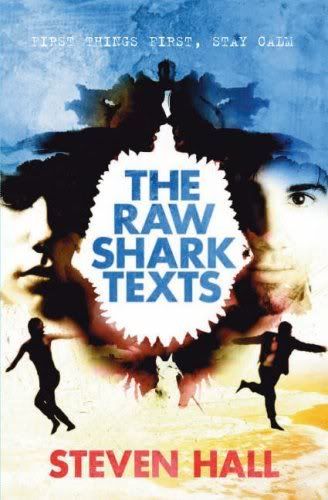
With its creative employ of mixed media and a feverish plot which can be read two ways, The Raw Shark Texts (and yes, it is a pun on the famous Rorschach inkblot tests) is indeed a masterpiece which spans time and genres.
It's also being made into a movie with the screenplay adapted by Simon Beaufoy, who wrote the screenplay for Slumdog Millionaire.
Steven Hall's use of media throughout the book, and his way of playing with format, is clever and unforgettable; the image of a shark created from text fragments (see right) crops up throughout the novel, notably in a forty-page+ break which slowly depicts the shark swimming closer and closer to the reader.
throughout the book, and his way of playing with format, is clever and unforgettable; the image of a shark created from text fragments (see right) crops up throughout the novel, notably in a forty-page+ break which slowly depicts the shark swimming closer and closer to the reader.
The shark is called a Ludovician, and it's after Eric Sanderson- the Second Eric Sanderson, that is, and he's receiving help from the First Eric Sanderson who has sent him letters from the past. While Eric's psychologist tells him he has amnesia and that he has forgotten his previous identity, the letters from Eric himself slowly reveal that this may not be the case at all- in fact, a conceptual thought fish has eaten his memory, and this particular fish is a rare predator which locks onto its prey until it completely devours the individual's thoughts, ideas, and memories. If this happens, Eric can live what is called a "twilight life" or a fake existence with no previous memories, until his time for death rapidly approaches. Eager to escape the Ludovician and to understand why it is chasing him, Eric sets out to find the source of the letters with his cat, Ian, and a mysterious woman, Scout.
Slowly, Eric begins to learn about his previous self. Suffering immensely after the death of his girlfriend Clio, the First Eric Sanderson does some very foolish things which lead to the Second Eric Sanderson's current situation. But even if Eric understands all of the clues, will he be able to save himself?
The story itself moves gradually away from reality as Scout and Eric search for the elusive Dr. Trey Fidorous, who presumably has all the answers (Ian's just along for the ride). The immensely satisfying facet of the story is that it can be read two ways- Eric Sanderson is on the frontier of science, but is merely trying to understand himself and to recapture his beloved; or, Eric Sanderson suffers from fugue, a condition which induces amnesia multiple times, and much of the story takes place entirely in his head as he progresses toward insanity and eventual death.
Hall's style is very introspective, and also very lyrical. His words are full to the brim with images, as well as references and memories and tiny details of how Eric views life. While intensely poetic, Hall's technique also manages to be snappy, face-paced, and funny; he captures the quirky every day moments in life and the private dialogue between friends and lovers realistically, something that so many authors try (and fail) to do.
The book itself has a little something for everyone- the basis of Eric Sanderson's conceptual thought fish predator is in science-fiction; riveting chases with the Ludovician are there for those who like action; for mystery-lovers, the whole book is more or less a logic puzzle, and a search for the enigmatic Dr. Fidorous; there is a compelling story of modern love; and, as an added bonus, there is an ambiguous ending.
How much better can it get?
Steven Hall's use of media
 throughout the book, and his way of playing with format, is clever and unforgettable; the image of a shark created from text fragments (see right) crops up throughout the novel, notably in a forty-page+ break which slowly depicts the shark swimming closer and closer to the reader.
throughout the book, and his way of playing with format, is clever and unforgettable; the image of a shark created from text fragments (see right) crops up throughout the novel, notably in a forty-page+ break which slowly depicts the shark swimming closer and closer to the reader.The shark is called a Ludovician, and it's after Eric Sanderson- the Second Eric Sanderson, that is, and he's receiving help from the First Eric Sanderson who has sent him letters from the past. While Eric's psychologist tells him he has amnesia and that he has forgotten his previous identity, the letters from Eric himself slowly reveal that this may not be the case at all- in fact, a conceptual thought fish has eaten his memory, and this particular fish is a rare predator which locks onto its prey until it completely devours the individual's thoughts, ideas, and memories. If this happens, Eric can live what is called a "twilight life" or a fake existence with no previous memories, until his time for death rapidly approaches. Eager to escape the Ludovician and to understand why it is chasing him, Eric sets out to find the source of the letters with his cat, Ian, and a mysterious woman, Scout.
Slowly, Eric begins to learn about his previous self. Suffering immensely after the death of his girlfriend Clio, the First Eric Sanderson does some very foolish things which lead to the Second Eric Sanderson's current situation. But even if Eric understands all of the clues, will he be able to save himself?
The story itself moves gradually away from reality as Scout and Eric search for the elusive Dr. Trey Fidorous, who presumably has all the answers (Ian's just along for the ride). The immensely satisfying facet of the story is that it can be read two ways- Eric Sanderson is on the frontier of science, but is merely trying to understand himself and to recapture his beloved; or, Eric Sanderson suffers from fugue, a condition which induces amnesia multiple times, and much of the story takes place entirely in his head as he progresses toward insanity and eventual death.
Hall's style is very introspective, and also very lyrical. His words are full to the brim with images, as well as references and memories and tiny details of how Eric views life. While intensely poetic, Hall's technique also manages to be snappy, face-paced, and funny; he captures the quirky every day moments in life and the private dialogue between friends and lovers realistically, something that so many authors try (and fail) to do.
The book itself has a little something for everyone- the basis of Eric Sanderson's conceptual thought fish predator is in science-fiction; riveting chases with the Ludovician are there for those who like action; for mystery-lovers, the whole book is more or less a logic puzzle, and a search for the enigmatic Dr. Fidorous; there is a compelling story of modern love; and, as an added bonus, there is an ambiguous ending.
How much better can it get?
-elln

No comments:
Post a Comment